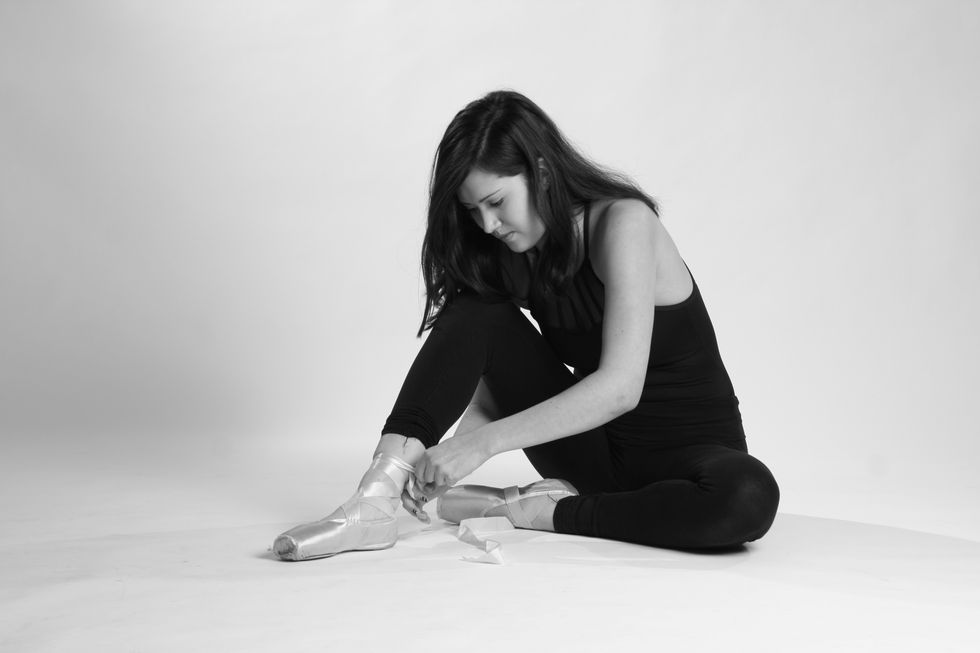When I was 4-years-old, my mom decided to put me in dance classes. She wanted me to have an extracurricular activity that I could do throughout my adolescence. I think she also wanted something to occupy my time so that I would stay out of trouble. After trying piano, gymnastics, swimming, and other activities, dance was the one that stuck.
I danced for 14 years. I joined the studio when I was four, and then went to a school of the arts for 8th grade through high school graduation. I danced in the pre-professional company of my studio and took classes at school, which led to roughly 24 hours a week of dance practice. For most of my life I loved it, but in my junior year of high school, I began to dread going to classes.
There is a difference between performing and taking a class. When I was performing the world melted away and my problems ceased to exist. It was very therapeutic. One of my happiest memories was being fortunate enough to dance as the Sugar Plum Fairy in my studio's production of the Nutcracker. However, the class environment was much different.
Dance class takes place in a studio room with generally at least one wall covered entirely in mirrors. This is because dance is a visual art, so execution has to be perfect. When you are a dancer you spend hours staring at yourself in a mirror working to correct all the flaws of your body. This desire to have a “perfect dancer body” takes a toll, especially when you are being compared to other people.
Part of this “perfect body” is flexibility. There are people who are naturally more flexible than others, which is not to say they do not also have to work for their flexibility but their bodies may be better designed to develop flexibility. My body was never like that. I had to work for years to get my splits, and no matter how hard I tried, I knew my legs would never be able to extend like other girls’. It also did not help that a clear favoritism for people with this natural flexibility was often occurring.
This favoritism was especially damaging because dance is a very competitive field. Not everyone can be the soloist or principal dancer, but everyone wants to. You are being actively judged on your body’s natural ability and compared to the capability of another person. There is no way to change your anatomy, but to be compared to other people who can do things you never will be able to do while continually losing out to them is frustrating, to say the least.
I felt like my inability to perform as well some people was a comment on my work ethic; that I was being seen as lazy because I did not lift my leg as high. While I understand that it is a teachers job to push students, dance class began to feel less like I was learning something and more like an opportunity to be shamed for my body’s natural inabilities.
This huge focus on body type also began to take a toll on my mental health. When you can no longer feel confident in yourself in one large area of your life you begin to lose confidence in yourself entirely. With this mentality that my instructors thought I was not trying, I actually did stop trying as hard. I began to accept the fact that I was less capable, so I should quit trying.
After having committed most of my life to dance and to no longer feel like I belonged in that world was very discouraging. I always hoped, when I was younger, that my future would include dance, but my new reality was that it would not. I had to change my perspective on why I was doing it.
I did almost quit in my senior year of high school, but I continued just so I could say to myself I never did give up. However, when I finally took a long break from dance after graduation, I realized I did not miss it. I used to go on vacation and miss dancing, but that was no longer the case. So when the opportunity came around to go back, I decided not to.
There are times when I miss dancing. I miss the feeling I had when I performed, that feeling of being untouchable when you are on stage. However, now I have a healthier image of what my body needs. I am no longer pushing my body into doing things it was not made to do. I quit dancing for the sake of my own mental and physical health.
Dance is a beautiful art form that I wish I could have pursued but I know that for my personal health, it was just something I could no longer pursue. I am happier in my life knowing that the only body I am comparing myself to is my own. I will be forever grateful for the discipline and skills dance taught me and I will always miss the rush of performing on stage, but I am happier and healthier now than I was when I danced.



















